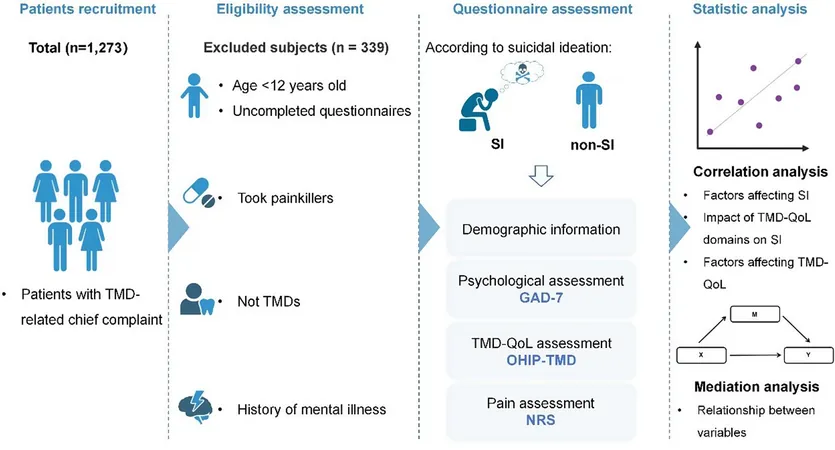
Anxiety and Suicidal Thoughts: Unraveling the Hidden Link in Temporomandibular Disorder Patients
2025-07-07
Author: Benjamin
A Concerning Connection
Chronic musculoskeletal disorders are notorious for being linked to suicidal ideation (SI). Among these, temporomandibular disorders (TMDs) stand out due to their debilitating pain, psychological distress, and significant reduction in quality of life, all of which could heighten the risk of SI. Surprisingly, research exploring these links within the context of TMDs remains sparse.
The Study Breakdown
A recent cross-sectional analysis involving 934 TMD patients sought to uncover the factors contributing to suicidal thoughts and the mechanisms by which they affect patients. Through comprehensive questionnaires assessing demographic details, anxiety levels, pain severity, and TMD-related quality of life (TMD-QoL), the researchers employed correlation and mediation analyses to dissect these relationships.
Eye-Opening Findings
The data revealed a shocking correlation between anxiety and SI, with an odds ratio of 6.74 (p < 0.001). After adjustments, this remained significant. Factors impacting quality of life, like psychological discomfort and social disability, were also linked to increased SI. Notably, pain and TMD-QoL were found to mediate the relationship between anxiety and SI, illustrating a complex web of influence.
Highlighting Hidden Risks
This urgent research highlights the critical importance of psychological screenings in the management of TMD patients, potentially identifying those at heightened risk for SI. However, it's worth noting that the study's cross-sectional design limits the ability to establish causal links, making longitudinal studies essential for deeper insights.
Understanding TMDs and Psychological Struggles
TMDs, which affect the temporomandibular joint and surrounding structures, are not only physically painful but are often exacerbated by psychological factors. With a prevalence of 5.3% to 12.0% in the general population and even higher among those with anxiety, TMD patients often face reduced pain thresholds and greater symptom catastrophizing.
The Allure of Psychological Assessment
Suicidal ideation is a dire psychological condition, and many studies underscore the gravity of untreated psychological disorders, which can elevate suicide risk dramatically. Chronic pain patients can face SI rates as high as 28.3%. Given the intertwined nature of TMD, anxiety, and chronic pain, recognizing psychological disturbances is paramount for holistic treatment.
Future Directions for Research
Despite its revelatory findings, this study calls for more robust research frameworks in the future. Multicenter and longitudinal studies should provide a broader understanding of how these factors interact over time. Furthermore, a more detailed psychiatric assessment could unveil deeper nuances in patients’ mental health, influencing their quality of life.
A Wake-Up Call
In conclusion, the interplay between anxiety, pain, and TMD-QoL underscores a dire need for comprehensive care strategies for TMD patients. As anxiety dramatically increases the likelihood of suicidal thoughts, addressing psychological health may be just as crucial as treating the physical symptoms. This research serves as a wake-up call to prioritize psychological evaluations and interventions in managing TMD, ensuring better, more effective care for those suffering.









 Brasil (PT)
Brasil (PT)
 Canada (EN)
Canada (EN)
 Chile (ES)
Chile (ES)
 Česko (CS)
Česko (CS)
 대한민국 (KO)
대한민국 (KO)
 España (ES)
España (ES)
 France (FR)
France (FR)
 Hong Kong (EN)
Hong Kong (EN)
 Italia (IT)
Italia (IT)
 日本 (JA)
日本 (JA)
 Magyarország (HU)
Magyarország (HU)
 Norge (NO)
Norge (NO)
 Polska (PL)
Polska (PL)
 Schweiz (DE)
Schweiz (DE)
 Singapore (EN)
Singapore (EN)
 Sverige (SV)
Sverige (SV)
 Suomi (FI)
Suomi (FI)
 Türkiye (TR)
Türkiye (TR)
 الإمارات العربية المتحدة (AR)
الإمارات العربية المتحدة (AR)